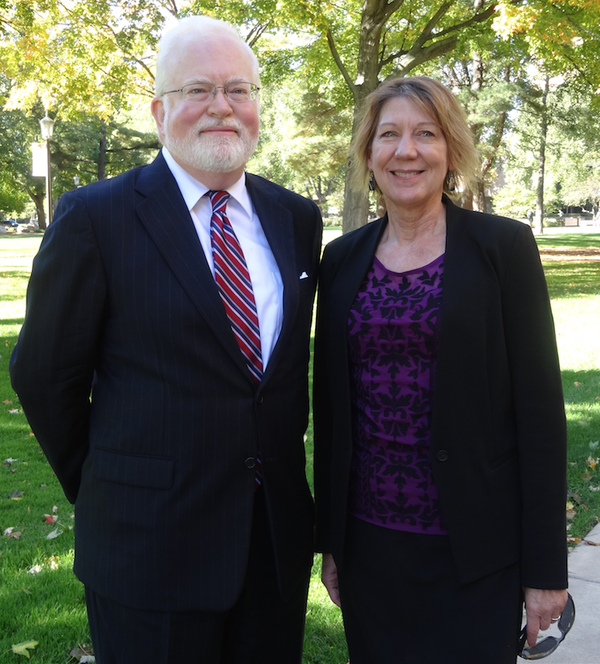The 2016 Paul P. Weinstein Memorial Lecture presented by the Eck Institute for Global Health featured B. Fenton “Lee” Hall, MD, PhD, Chief of the Parasitology and International Programs Branch (PIPB) in the Division of Microbiology and Infectious Diseases (DMID) at the National Institute of Allergy and Infectious Diseases (NIAID), part of the National Institutes of Health (NIH).
In 1946, as a Captain in the U.S. Public Health Service, Weinstein played a significant role in the establishment of the Communicable Diseases Center, which eventually became the Centers for Disease Control and Prevention. He spent the next 20 years at the National Institutes of Health, where he retired in 1968 as the Director of the Laboratory of Parasitic Diseases. Weinstein, a leading authority on parasitology, vector biology, and public health, then joined the Department of Biological Sciences at the University of Notre Dame as Professor and Department Chair. For more than 21 years he was an exceptional researcher, teacher, and mentor. Reflecting his passion for research, he continued working and publishing after his retirement from teaching in 1990 until his death in 2008.

Hall delivered a powerful lecture to a full auditorium of students and faculty. Hall’s lecture focused on the dynamics of global health, team science collaborations, and strategic innovations. Hall stated the new global health strategies must include the six “E’s” for any program: epidemiology, environment, evaluation, economics, evaluation, and equity.
The career of Dr. Lee Hall fittingly reflects and embodies the ideals and achievements of Weinstein. Both men have made significant contributions to the United States’ premier biomedical research institution, the National Institutes of Health, and specifically to a better understanding of the parasites that cause human suffering and death around the globe. Also, they were both heavily involved in the prestigious American Society for Tropical Medicine and Hygiene. “Like Paul Weinstein, Lee Hall has devoted his professional life to reducing the burden of some of the world’s most horrific and persistent diseases, which afflict the most vulnerable populations. The university is fortunate to have him share his perspective on the evolution of these diseases and the approaches to their – not just control – but elimination,” notes Katherine Taylor, Associate Director and Director of Global Health Training of the Eck Institute for Global Health.
Hall oversees multiple programs involving grants and contracts that support basic, translational, and clinical research and development in parasitology and vectors responsible for transmission of parasites and other infectious agents. In 2000, he was promoted to Chief of the Malaria Vaccine Development Section and in 2005 to Branch Chief, PIPB. PIPB supports research that will improve the diagnosis, prevention, and treatment of parasitic diseases, especially those that cause the greatest global burden. Hall has served on numerous committees, advisory and review panels for NIH, federal and international activities involving basic and translational R&D and global health, and has chaired and participated in numerous scientific symposia on vaccine R&D and tropical infectious diseases at national and international meetings. From 2010 to 2013 he served as a Member-at-Large on the Steering Committee of the Decade of Vaccines Collaboration, and since 2013 he has served as the NIAID Representative for the Decade of Vaccines Secretariat.
Hall received his AB from Harvard College, and his MD and PhD in Immunology from the New York University School of Medicine. He completed his residency in Internal Medicine at the Johns Hopkins Hospital, and infectious diseases subspecialty training at the NIH and Yale University School of Medicine. He is a Fellow of the Infectious Diseases Society of America.
The Eck Institute for Global Health is a university-wide enterprise that recognizes health as a fundamental human right and endeavors to promote research, training, service to advance health standards for all people, especially people in low and middle-income countries, who are disproportionately impacted by preventable diseases.
Photo L to R: Lee Hall and Katherine Taylor
Originally published by at globalhealth.nd.edu on October 19, 2016.
